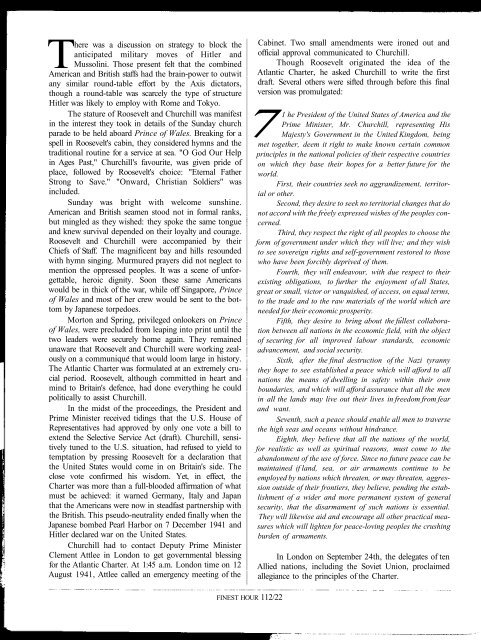What kind of a People do they think we are? - Winston Churchill
What kind of a People do they think we are? - Winston Churchill
What kind of a People do they think we are? - Winston Churchill
- No tags were found...
You also want an ePaper? Increase the reach of your titles
YUMPU automatically turns print PDFs into web optimized ePapers that Google loves.
There was a discussion on strategy to block theanticipated military moves <strong>of</strong> Hitler andMussolini. Those present felt that the combinedAmerican and British staffs had the brain-po<strong>we</strong>r to outwitany similar round-table effort by the Axis dictators,though a round-table was scarcely the type <strong>of</strong> structureHitler was likely to employ with Rome and Tokyo.The stature <strong>of</strong> Roosevelt and <strong>Churchill</strong> was manifestin the interest <strong>they</strong> took in details <strong>of</strong> the Sunday churchparade to be held aboard Prince <strong>of</strong> Wales. Breaking for aspell in Roosevelt's cabin, <strong>they</strong> considered hymns and thetraditional routine for a service at sea. "O God Our Helpin Ages Past," <strong>Churchill</strong>'s favourite, was given pride <strong>of</strong>place, follo<strong>we</strong>d by Roosevelt's choice: "Eternal FatherStrong to Save." "Onward, Christian Soldiers" wasincluded.Sunday was bright with <strong>we</strong>lcome sunshine.American and British seamen stood not in formal ranks,but mingled as <strong>they</strong> wished: <strong>they</strong> spoke the same tongueand knew survival depended on their loyalty and courage.Roosevelt and <strong>Churchill</strong> <strong>we</strong>re accompanied by theirChiefs <strong>of</strong> Staff. The magnificent bay and hills resoundedwith hymn singing. Murmured prayers did not neglect tomention the oppressed peoples. It was a scene <strong>of</strong> unforgettable,heroic dignity. Soon these same Americanswould be in thick <strong>of</strong> the war, while <strong>of</strong>f Singapore, Prince<strong>of</strong> Wales and most <strong>of</strong> her crew would be sent to the bottomby Japanese torpe<strong>do</strong>es.Morton and Spring, privileged onlookers on Prince<strong>of</strong> Wales, <strong>we</strong>re precluded from leaping into print until thetwo leaders <strong>we</strong>re securely home again. They remainedunaw<strong>are</strong> that Roosevelt and <strong>Churchill</strong> <strong>we</strong>re working zealouslyon a communique that would loom large in history.The Atlantic Charter was formulated at an extremely crucialperiod. Roosevelt, although committed in heart andmind to Britain's defence, had <strong>do</strong>ne everything he couldpolitically to assist <strong>Churchill</strong>.In the midst <strong>of</strong> the proceedings, the President andPrime Minister received tidings that the U.S. House <strong>of</strong>Representatives had approved by only one vote a bill toextend the Selective Service Act (draft). <strong>Churchill</strong>, sensitivelytuned to the U.S. situation, had refused to yield totemptation by pressing Roosevelt for a declaration thatthe United States would come in on Britain's side. Theclose vote confirmed his wis<strong>do</strong>m. Yet, in effect, theCharter was more than a full-blooded affirmation <strong>of</strong> whatmust be achieved: it warned Germany, Italy and Japanthat the Americans <strong>we</strong>re now in steadfast partnership withthe British. This pseu<strong>do</strong>-neutrality ended finally when theJapanese bombed Pearl Harbor on 7 December 1941 andHitler decl<strong>are</strong>d war on the United States.<strong>Churchill</strong> had to contact Deputy Prime MinisterClement Attlee in Lon<strong>do</strong>n to get governmental blessingfor the Atlantic Charter. At 1:45 a.m. Lon<strong>do</strong>n time on 12August 1941, Attlee called an emergency meeting <strong>of</strong> the |Cabinet. Two small amendments <strong>we</strong>re ironed out and<strong>of</strong>ficial approval communicated to <strong>Churchill</strong>.Though Roosevelt originated the idea <strong>of</strong> theAtlantic Charter, he asked <strong>Churchill</strong> to write the firstdraft. Several others <strong>we</strong>re sifted through before this finalversion was promulgated:71 he President <strong>of</strong> the United States <strong>of</strong> America and thePrime Minister, Mr. <strong>Churchill</strong>, representing HisMajesty's Government in the United King<strong>do</strong>m, beingmet together, deem it right to make known certain commonprinciples in the national policies <strong>of</strong> their respective countrieson which <strong>they</strong> base their hopes for a better future for theworld.First, their countries seek no aggrandizement, territorialor other.Second, <strong>they</strong> desire to seek no territorial changes that <strong>do</strong>not accord with the freely expressed wishes <strong>of</strong> the peoples concerned.Third, <strong>they</strong> respect the right <strong>of</strong> all peoples to choose theform <strong>of</strong> government under which <strong>they</strong> will live; and <strong>they</strong> wishto see sovereign rights and self-government restored to thosewho have been forcibly deprived <strong>of</strong> them.Fourth, <strong>they</strong> will endeavour, with due respect to theirexisting obligations, to further the enjoyment <strong>of</strong> all States,great or small, victor or vanquished, <strong>of</strong> access, on equal terms,to the trade and to the raw materials <strong>of</strong> the world which <strong>are</strong>needed for their economic prosperity.Fifth, <strong>they</strong> desire to bring about the fullest collaborationbet<strong>we</strong>en all nations in the economic field, with the object<strong>of</strong> securing for all improved labour standards, economicadvancement, and social security.Sixth, after the final destruction <strong>of</strong> the Nazi tyranny<strong>they</strong> hope to see established a peace which will afford to allnations the means <strong>of</strong> d<strong>we</strong>lling in safety within their ownboundaries, and which will afford assurance that all the menin all the lands may live out their lives in free<strong>do</strong>m from fearand want.Seventh, such a peace should enable all men to traversethe high seas and oceans without hindrance.Eighth, <strong>they</strong> believe that all the nations <strong>of</strong> the world,for realistic as <strong>we</strong>ll as spiritual reasons, must come to theaban<strong>do</strong>nment <strong>of</strong> the use <strong>of</strong> force. Since no future peace can bemaintained if land, sea, or air armaments continue to beemployed by nations which threaten, or may threaten, aggressionoutside <strong>of</strong> their frontiers, <strong>they</strong> believe, pending the establishment<strong>of</strong> a wider and more permanent system <strong>of</strong> generalsecurity, that the disarmament <strong>of</strong> such nations is essential.They will likewise aid and encourage all other practical measureswhich will lighten for peace-loving peoples the crushingburden <strong>of</strong> armaments.FINEST HOUR 112/22In Lon<strong>do</strong>n on September 24th, the delegates <strong>of</strong> tenAllied nations, including the Soviet Union, proclaimedallegiance to the principles <strong>of</strong> the Charter.

















